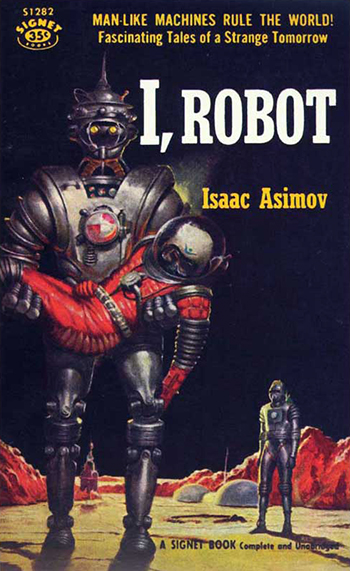Directed by Alex Proyas in the near future of 2035, in the 2004 sci-fi movie “I, Robot,” “First, robots cannot harm humans, and humans suffer from dangerous situations. You shouldn’t even look around when you come. Second, robots must obey human commands unless they violate the first principle. Third, in the line that does not violate the first and second principles, the robot must protect its existence.”

I, Robot Ⓒ Isaac Asimov
This’Three Laws of Robotics’ is a world-class American from Russia called the’Three Masters’ of modern science fiction literature with Robert A. Heinlein and Arthur Charles Clarke. The concept first proposed by novelist Isaac Asimov (1920-1992) in his short science fiction novel’Runaround’ (1942), a collection of short stories from science fiction magazines’Super Science Stories’ and’Astounding Science Fiction’ It became more concrete in’I, Robot’ (1950), and became the original work and motif of the movie’I, Robot’.
And Isaac Asimov later wrote’Robots and Empire’ in the’Three Robots Principles’, saying, “Robots must not harm mankind or cause harm to mankind by not acting.” Law)’ was added. “Robots must act for the original purpose of dedication to humanity.” The’law of robots’, which can be abbreviated, is a philosophical question that the basic principle that advances in science and technology ultimately cares for humans should be observed. It had a great influence on the ethics of robots and artificial intelligence.

Foundation Ⓒ Isaac Asimov
Isaac Asimov, who studied biology and chemistry at Columbia University, showed his genius when he made his sci-fi literature debut, starting with his first short novel,’Marooned off Vesta’, published in the March issue of sci-fi magazine’Amazing Stories’ at the age of 19. He began his career and worked as a commentator on a wide range of scientific fields, including astronomy, physics, chemistry, and biology.
Among Isaac Asimov’s works, the’Foundation series’ is a science fiction novel about the 500 years of history of’Foundation’, a fictional country of the future galaxy, with Harry Seldon, a psychohistorian of Galactic Empire to be. The’Foundation series’ consists of seven volumes including the first book in 1951, and won the’Best All-Time Series’ at the Hugo Awards given by the’World Science Fiction Society’. It has been produced in the Apple TV+ series since 2021. <관련동영상>

The Stars, Like Dust Ⓒ Isaac Asimov
The Galactic Empire is composed of’Pebble in the Sky (1950)’,’The Stars, Like Dust (1951)’ and’The Currents of Space (1952)’. Trilogy)’ is another masterpiece of Isaac Asimov’s heyday of the galactic empire. After the Earthlings went out to space in ‘Robots and Empire’, the establishment of a galactic empire centered on the planet Trenter appearing in the ‘Foundation series’. A wide range of time zones to and from are covered.
Robot series collection’Robots and Empire’ including shorts’I, Robot’,’The Rest of the Robots’,’Robot Dreams’,’The Positronic Man’,’The Caves of Steel’,’The Robots of Dawn’ and more ‘Was published in 1985.

The Bicentennial Man Ⓒ Isaac Asimov
‘The Bicentennial Man’, which won the Hugo and Nebula Awards, was released as a mid-length film in 1976 and then republished as a feature film in 1992. It was produced as a science fiction film of the same name by director Chris Columbus. In the movie, the robot’Andrew (nickname for NDR-114)’ is depicted as an intelligent robot that can communicate with humans as a housework robot, live together, and take care of household chores. <관련동영상>
In the movie, the robot’Andrew’ has a desire to become a human and eventually puts it into action.The original novel’The Bicentennial Man’ is based on a robot that wants to become a human even while giving up his immortality. It raises philosophical questions about the boundaries of human beings, the definition of being human, and what humanity is.
Isaac Asimov received 14 honorary doctorate degrees from several leading universities. In 1971, he was awarded the’Damon Knight Memorial Grand Master’ from the American Science Fiction Writers Association for outstanding contributions to science fiction and fantasy literature. He received the title of’Grand Master of Science Fiction’, and since 1977, a science fiction magazine named’Asimov’s Science Fiction Magazine’ has been published.
(602)
